
|
HQ., CHINESE COMBAT COMMAND, May 3 - (Special to the China Lantern) - One of the most important battles of recent months in eastern free China loomed in imminent prospect this week as a four pronged Japanese offensive, moving in a generally westward and northwestward direction from the enemy communications center at Paoching, reached a position roughly 70 air miles from the important American air base at Chihchiang.
If the Japanese can break through the Chinese defense ring and capture Chihchiang, they will not only have deprived the 14th Air Force of one of its forward bases, but will also have established themselves in the heart of one of China's richest rice producing areas.
Baffled in their original attempt to drive straight westward toward the American base by stubborn Chinese defensive fighting in the rugged Paimashan bombing and strafing attacks by the 14th Air Force, the Japanese have now started a wide outflanking attack to the southwest in the area of Chenliang and Chengsien, where they are now opposed by strong Chinese forces. During the week now ending, the Chinese withdrew slowly before the invading forces inflicting heavy casualties.
At one point in the Painashan area, the Chinese scored a decisive success by wiping out a Japanese battalion which formed a northern prong of the offensive. Farther south however, the Japs captured the walled village of Wuyang after a spirited defense. There also was stiff fighting in the Tungkou area and near Kiangkou, where heavy casualties were inflicted on both sides.
The important city of Wukang, approximately 70 air miles southeast of Chihchiang has been invested on three sides by the enemy but was still holding out according to latest reports reaching Chinese Combat Command headquarters.
False “Surrender” Report Extraed By American Press
WASHINGTON (ANS) - A statement by an American delegate at the United Nations Conference at San Francisco late last Saturday that an announcement of Nazi surrender could be expected momentarily set off premature victory celebrations in many parts of the United States during the evening and resulted in a quick denial by Pres. Truman that Germany had capitulated.
A rumor that the Nazis had quit circulated the globe and even precipitated impromptu celebrations among conference delegates after newspaper extras carried an Associated Press report, based on a statement made to a reporter by Sen. Tom Connelly, Tex.-D., about the surrender being imminent. The statement was supported, the Associated Press said, by another member of the U.S. delegation who could not be quoted by name at the time.
Connelly told the Associated Press that his information said the surrender offer originated with Heinrich Himmler with the explanation that Adolph Hitler was ill and that Himmler was acting in Hitler's sted.
DELEGATES LEAVE CONFERENCE
When the reports of the statement reached the San Francisco Opera House during the fourth plenary session of the conference, the delegates broke into cheering. Soviet Foreign Commissar M. Molotov, presiding for the first time, finally restored order, but the delegates streamed out of the building as the proceedings continued
Newspapermen rushed to the White House on the basis of the Associated Press report and were told by presidential secretary Early that if a proclamation were issued, the President would read it on the air. At 9:34 p.m. the reporters were called into the President's office and Pres. Truman, breaking the rules about direct quotations said, Well, I was over here, as you can see, doing a little work. I had a call from San Francisco and the State Department called me. I just got in touch with Adm. Leahy (personal chief of staff to the President) and had him call our headquarters commander-in-chief (Gen. Eisenhower) in Europe and there is no foundation for the rumor. That is all I have to say."
RUSH TO TIMES SQUARE
Early evening editions of many newspapers across the nation hit the street with large type headlines of the story that snowballed from the Associated Press report out of San Francisco.
Thousands of persons trooped in dejection from Times Square where they rushed to celebrate what turned out to be a false report. There were even ticker-tape and carnival demonstrations for awhile, but they soon disappeared as it became obvious that the war in Europe was not over. Men, women and even servicemen wept unashamedly as Pres. Truman made it clear that surrender reports were without foundation.
At Carnegie Hall, where Fred Waring was conducting a concert, Waring grabbed the microphone and announced, "I hate to interrupt this concert in this fashion, however I believe you have already heard the news. In case you have not, here it is - Germany has surrendered unconditionally."
Waring went on to say "We are now waiting for Pres. Truman to go on the radio and make the official announcement." The crowd cheered. The orchestra immediately struck up with "God Bless America."
SAILORS LEAVES CANCELLED
In Chicago's loop district, crowds surprisingly quiet and subdued, surged into stores without demonstration. All police leaves were cancelled, but the order was rescinded after the President's announcement. In servicemen's centers, sailors at first were ordered back to their stations by shore patrol details but were allowed to gather again after the official denial.
Newspapers appeared on the streets with blazing headlines. The Chicago Tribune said: "Germany gives up." The Chicago Times: "Victory extra - Germany quits."
And so the celebrations rolled across America. In San Francisco the Chronicle and the Call-Bulletin issued "surrender" extras. A newsreel theater heralded the report with "Germany quits" on its marquee but quickly changed it to read "Germany Crumbling." The Atlanta Journal and Constitution were on the streets with "surrender" editions and rialto and Rhodes theater patrons emptied into the streets when they heard the surrender announcement. Liquor stores and bars closed. At several churches congregations gathered for prayers of thanksgiving and at the Atlanta paramount theater a minister was called to the stage to lead the audience in prayer.
RANGOON TAKEN; FUTURE SUPPLY BASE FOR CHINA
By JOHN GROVER
ALFSEA HEADQUARTERS, May 3 (AP) - Rangoon has been entered, it was officially announced here tonight.
Empire troops culminated their brilliant dash down the length of Burma this morning when the pagoda-studded first city - goal of three years of bloody fighting - was gained by the armored spearheads which have smashed down Burma from Mandalay in six weeks.
Though the official flash cautiously said only that Rangoon had been "entered," informed sources believe the city is firmly in British hands. There have been mounting indications for the past week that the Japanese had recognized defeat and were evacuating Rangoon.
The destruction of harbor installations, reported by airmen who saw huge waterfront fires, and the flight of high ranking Japanese officers - one of whom, a major general, was slain in an ambush near Pegu - together indicated a Japanese withdrawal.
Fliers yesterday said they had seen a sign "Japs gone" in strips of cloth on the roof of a downtown Rangoon building.
It is evident that the Japanese' last real stand in the delta area of Burma was near Pegu, where he fought desperately to gain a little time as the debacle grew imminent. After the Pegu defense collapsed, the road to Rangoon was wide open, and empire armor surged through.
The fate of the city was sealed completely when paratroopers dropped on the Elephant point promontory at the mouth of the estuary, and were followed next day by amphibious troops which sealed off the main water escape route. The converging columns made the fall of the city certain.
The capture of Rangoon is a major tactical victory, but is far greater in a strategic sense. Rangoon is a magnificent deep-water port, and the railroad that leads to Lashio will, when repaired, cut incalculable time and distance from the long haul to China. Additionally, the Irrawaddy river route is always open and can carry heavy tonnage north to a Burma Road terminus.
Likewise, with the capture of Rangoon the goal of Singapore moves inestimably closer. The delta area bases are collectively a cocked pistol pointed at the Japs in Malaya. It is obvious that the Allies have complete superiority in the air, on the ground and at sea. The possession of Rangoon brings the Allies within flight range of objectives on the Malay peninsula, and it seems obvious that the same smashing tactics that scored in Burma's reoccupation will be repeated farther east.
The Japs who in march, 1943 had invaded India and bragged of their "march on Delhi" are now reduced to a toehold in southeastern Burma, with Moulmein as its center. It does not seem likely they are destined for long tenure there.
It was three years ago that Gen. Joseph W. Stilwell led a footsore, defeated remnant of his command out of Burma after absorbing his famous "hell of a beating."
Today the picture is exactly reversed. The Jap has had his air force in Burma completely overwhelmed and eliminated as a tactical weapon. The waterways have been largely denied him except for sneak movements in small craft. His vaunted Burma armies are smashed into straggling fragments, wandering aimlessly east looking for an escape route.
And, most importantly, the Jap has lost Burma.
|
* * * * * * * * * Troops Must Be In By 2400 Hours Saturdays, Holidays; 2300 Hours On All Other Nights Message From The Theater Commander : - "Instructions have been issued, establishing a curfew for all United States military personnel in the China Theater at 2400 hours on Saturday and holiday nights and 2300 hours on all other nights effective 15 May 1945. Similar instructions have been issued by Generalissimo Chiang Kai-shek through Free China applying to all Chinese military personnel. The China Theater will thereby be placed on the same war time basis which has long prevailed in the Pacific and in Britain and the Service Commands within the United States. In the Pacific areas, for example, the curfew is at 2200 hours. However, in view of transportation difficulties in this theater and the substantial distances involved, it has been decided that the hours stated above for China Theater are more applicable and will not impose a hardship. The purpose of the curfew is to assist in the maintenance of good health and maximum efficiency in furtherance of the war effort. After the defeat of Germany the center of gravity of the war will shift to the far east. It is the recognized duty of every American to maintain himself at the peak of efficiency in order to meet increased responsibilities. The inauguration of the curfew does not mean that we must or should curtail our plans for recreation and entertainment. It simply means that we must start earlier, come home earlier, get a good nights rest, and be in better shape for the following day's work."
|
China No Longer ‘Forgotten Front’
CT Vital Part of Overall Strategy, Says Wedemeyer
The following message to the U.S. Forces in the China Theater from the Theater commander on his recent trip to adjacent theaters and to the United States was written at the request of the Editor of the CHINA LANTERN.
"Accompanied by members of my staff I recently spent several weeks in the United States. It was my
|
|
"Perhaps there have been times in the past when we in this part of the world have felt that ours is the forgotten front. I can assure you that there is no occasion for such a feeling. Until now it has been necessary to focus the greater part of the military might of the United Nations on the defeat of Germany and on the task of reaching the outer ring of the Japanese bastions in the Pacific. But now great battles have been won. Our armies and those of our gallant allies have swept like roaring torrents through the heart of Germany. Japan hears the thunder of doom approaching crescendo, now our turn is coming. Because of our supply difficulties we are still not in a position to carry the main weight of the overall offensive, which will finally and completely destroy the Japanese armed forces and bring peace to the far east. Nevertheless we are a part, and a very important part of the vast and powerful dispositions which are being brought to bear on the enemy. On every hand in Washington I encountered a consciousness of our problems and a firm purpose to give us assistance and material support."
"From developments of the past few months you will have seen, of course, that Japan is being forced to change her strategy."
"Her sprawling conquests, conceived in perfidy and acquired by bloody aggression, have been cut in two with the fall of Iwo Jima and Okinawa. The rich islands of the south no longer pour raw materials into the maw of the Japanese military monster; instead, they have become a series of isolated death traps."
"Japan has now been crowded back into her home islands and her stolen Chinese provinces. With her navy practically eliminated as a striking force, and her air power seriously crippled, she must now fight on such land masses as are left to her. The greater portion of her logical battlefields are in the area for which we are responsible."
"You may be sure that the Chinese and American forces in the China Theater of Operations are in the minds and hearts of the American people. To them I took from you a message of resolution and determination. From them I bring a message of faith."
|
- A. C. WEDEMEYER, Lieutenant General, USA, Commanding.
|

by George H. Johnson
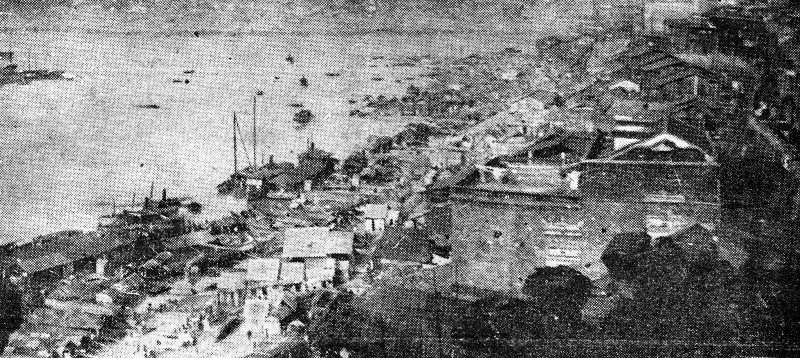 CHUNGKING WATERFRONT viewed from the intersection of the Chialing and Yangtse rivers.
CHUNGKING WATERFRONT viewed from the intersection of the Chialing and Yangtse rivers.
ITS MORE THAN ALMOST TWO YEARS since Chungking, capital of free China, has had even a token air raid from the Japanese and three years since it has been the victim of a real raid. Today, the strange sprawling city, perched on a vast boulder at the junction of the Yangtse and Chialing rivers, which, unlike any other national capital in the world, affords a peculiar paradox. While there is no evidence that Chungking once had an unenviable reputation as the world's most bombed city, the entire city is actually evidence of that tragic fact. Gimcrack frame houses - brown, squalid and battered - cling precariously to great precipices honeycombed with tunnels which are air raid shelters.
Much like bombed Kweilin, it has the appearance of a vast sprawling slum of jerrybuilt houses, because its years of existence under constant threat of devastation haven't given its people the incentive to establish buildings of any permanence, and only now after years of war and with some hope of that period of crisis and future danger almost past, are the first signs of future, solid, permanent Chungking beginning to appear - it's not being rebuilt as China's future capital nor even the capital of the province of Szechuan in which it lies (the ancient cultural city of Cheng-tu will remain the provincial capital), but as vitally important river market and commercial center of China's gigantic west.
|
China's future capital, when the last Japs are swept from the Asiatic mainland, will revert to ancient Peking, but Chungking will never be forgotten as the symbol of China's national pride and refusal to submit to aggression and tyranny.
The first impressions of Chungking are confined to three fundamentals - the heat, the hills and the squalidness. The heat is like a moist enveloping blanket, clammily stifling and robbing everybody, even the usually industrious Chinese, of almost all energy.
It is no exaggeration to say that Chungking has a worse climate than any other large city in the world - and with a population estimated at three quarters of a million it is a large city - for it is unbearably hot in midsummer and fiercely cold in winter. And for seven months of the year it is buried beneath a constant dirty fog with almost an unbroken drool of rain that covers the Yangtse river like an evil pall.
In summer, when officer hours are from seven in the morning until one in the afternoon, the city swelters under a blistering sun which flames in a brazen sky. Its heat throbs down twisting, dusty streets of white metallic glare and cruel black shadows where in grubby Szechuan teahouses, Chungking's motley people slump somnolently over tables or drowsily discuss current gossip over benches littered with cups of weak, green tea and scattered melon and sunflower seeds, or loll ungracefully against walls trying to summon enough energy to wave paper fans in front of their strained, sweating faces.
|
Outside, in the harsh glare of the town, laborers and coolies work slowly beneath "pungs" - bamboo matting erected to give shade - which are also erected, oddly, on vast scaffoldings around houses to give a bizarre untidiness to an already untidy city.
Even rickshaw coolies trot tiredly beneath pungs cleverly lashed between the shafts and hoods of the rickshaws to give them some little relief from the furnace-like blasts of air sweeping around the bare, rounded, stunted hills surrounding the city. Dust swirls constantly in the air. Men wear generally nothing but shorts, women flimsy silk or light cotton frocks split to their thighs. Kids scramble nakedly in the shade and women sprawl in doorways, some almost naked, others - for false modesty is alien to the Chinese way of life - with skirts rolled up to their exposed midriffs and breasts, languidly waving fans in front of their faces.
At late afternoon Chungking awakens again, exits somnolence, and dust rises in clouds, as huge ramshackle buses speed through streets packed like cans of sardines and exuding a heavy smell of the power of alcohol. Beneath the shade of a few limp and ragged trees, men and women stroll together - there are more than twice as many men as women in Chungking - the women, pretty and sophisticated with piquant faces and beautiful legs exposed to mid-thigh by flimsy, split skirts. It is the only time of the day when Chungking has beauty with the westing sun gliding tawdry buildings and driving golden shafts through dust clouds which mist the hills of deepening purple, and silhouetting blackly against the swirling stream of the Yangtse, which the sunset makes a flood of molten copper. Hundreds of picturesque junks and sampans line up for the evening on the mud banks beneath Gibraltar-like cliffs in this strange mountainous city.
Second in importance to the climate of Chungking is its terrain. There is probably no hillier city in all the world than this jagged peninsula of rock that climbs out of two rivers scarred by cliffs and gorges.
|
Huge cellars open up from the footpaths of the main streets and looking down, one sees precipitous warrens of clustered huts and hovels falling away hundreds of feet down the boulder-strewn slopes on which streets surprisingly rest. If, in what passed for a blackout at night, one fell headlong as one could easily do into one of these crowded basements, one could fall through a whole teaming residential quarter to be dashed to death on rocks three hundred feet below.
However, it is this unique combination of terrain and weather that has made Chungking what it is today created free China's capital out of a crowded, sordid town that less than a decade ago, was the center of Szechuan's banditry, mediaeval sorcery and feudal tyranny of warlords who even forced peasants to pay their taxes for fifty years ahead.
Chungking's clammy fogs gave the city complete protection from air raids for seven months of the year and Chungking's uncountable rocky hills gave the city its protection for the remaining five months - gave it its cave-shelters, burrowed for miles out of great crags, its cave-hospitals, its cave-offices, its cave-schools, its cave-factories, its cave-arsenals.
Here, for years of suffering and hardship, such as even London never knew, the battered population lived rather like troglodytes, while thousands upon thousands of their less fortunate people died in agony in a city much of which was blown or burnt to the ground in the 200 violent air attacks launched by six thousand Japanese bombers against the almost undefended city. Those days are nearly over, but not quite. And the Chinese people of Chungking who have learned the hard way to err on the side of caution are still scrabbling out new cave shelters - probably a wise precaution because while I was there we twice had "two ball" alerts.
Bombing has, in a sense, done a great deal of good to Chungking because much of the terrible squalid downtown area has been wiped out and roomier buildings and wide streets have been substituted on the ruins of ancient areas which had not improved with time.
It is generally known that Chungking, rather than being a new city, is actually one of China's oldest existing in the present position as the key to Szechuan and the west for more than 4200 years. On the peak of the Tusnah overlooking the lordly Yangtse, opposite the city, there is a little temple commemorating the emperor. Yet of the Hsia dynasty who ruled Cathay twenty two centuries before Christ, and whose queen was born in Chungking. It was twice a kingdom in its own right and many times a bandit stronghold from which western provinces were terrorized.
It was general Ho Yao-tsu, mayor of Chungking, who pointed out to me that the good spots of Chungking were new spots but the old squalor and teaming medieval filth were largely legacies of countless centuries of crude and crowded life. Much of that life has been unchanged by time and that's why you must never be surprised at anything in Chungking. You can see more sophisticated Chinese in western garb than any other city in China. And then in the next stride you can see sights straight from the middle ages - old wrinkled, bearded alchemists and sorcerers, grimy long-gowned Taoists with their primitive witchcraft, ragged peddlars and mendicants skulking in alleys industriously rubbing into horrible rawness dreadful sores and ailments that are their stock in trade.
|
You can talk to beautiful, sophisticated Chinese girls who have read more new books then you have, and can quote all the latest Hollywood wisecracks with poise and sophistication. You can wander in market places and in tawdry gimcrack bazaars, raucous with the din of public address systems, playing Chinese jazz or western boogie-woogie or both at once in a weinspring cacophony, you can find frightening masses of tawdry junk - garishly ornamented mirrors, cheap, tin trays and alarm clocks, pitiful copies of the trashiest evidence of western civilization and the reason for the Woolworth fortune. And next door to these "modern emporiums" with such quaintly intriguing signs as "Occidental tailor, very good man from Shanghai. We take off pants or blouses," you will find smelly dark little shops and on dusty shelves stand dried herbs for medieval medicines and stuffed rats and vipers pickled in dirty jars and on the shop floor, pigs and chickens and naked children scuffle together to the music of "Deep in the Heart of Texas."
On one street in Chungking, I stopped to inspect the goods offered by a long-whiskered peddler in an enormous straw hat. He had a heterogeneous collection of Chinese initiations of western products usually with one word of a name altered. For instance, he sold boot polish which was the exact copy of a Kiwi tin except that the name was "Kiri" and the bird represented had been altered rather extraordinarily by giving it the head of a lion.
Another day toward evening, I saw a huge black and glistening sedan pull up beside a small stretch of a dried-up park which extended uphill to another street. A short man in a simple, light khaki suit, with brass buttons and no ornaments whatever (what people in China call a Sun Yat-sen suit) got out, and as the car drove on, he strolled alone in the park with head bent thoughtfully and hands clasped behind his back. I knew who he was and I watched him. He was a lonely figure as he walked gently uphill and picked up the car again at a higher road. He looked unlike a soldier, rather like a scholar or professor worried by an income tax assessment. He had a quiet, highly intelligent face heavily lined by marks of strain. He looked much smaller, much older than I imagined he would. For this man was Generalissimo Chiang Kai-shek.
He had no bodyguard, no marks to distinguish him from any other citizen of Chungking except an indefinable something that made one realize why, to at least some degree, why China had kept fighting, why Chungking had been lifted from medieval barbarism to become a symbol to the whole world of China's will to keep fighting back even if the people had to burrow into rocks above the mighty Yangtse to do it. That is why the little figure in the Sun Yat-sen suit symbolized a picture of Chungking more important than its terrible heat, its teaming filthy warrens, its unbelievable squalor.
First-Aid Care One Of CCC’s Most Vital Training Projects
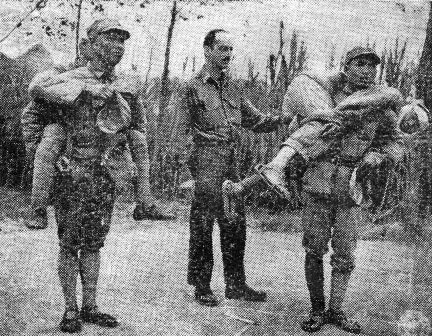 Aid men are taught approved methods of carrying wounded, at a field headquarters of the Chinese Combat Command.
Aid men are taught approved methods of carrying wounded, at a field headquarters of the Chinese Combat Command.
|
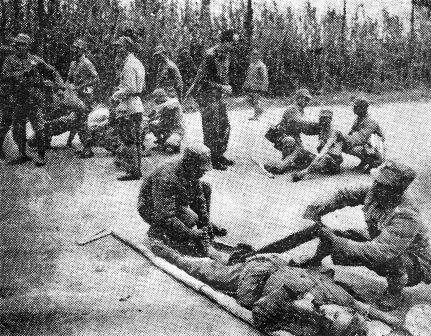 Capt. Albert Fields, U.S. Army Medical Corps, instructs Chinese soldiers in the application of splints and bandages.
Capt. Albert Fields, U.S. Army Medical Corps, instructs Chinese soldiers in the application of splints and bandages.
|
A CCC FORWARD INSTALLATION, SOUTHEAST CHINA - Modern medical service, as known in the Western world, was quite limited in China even before the outbreak of their current was July 7, 1937. Combat against a well-armed, vicious Japanese aggressor further limited facilities and personnel for medicine and surgery. Like other armies, only more so, China had the problem of training medical personnel from aid men on up to doctors and surgeons.
American medical men in Chinese Combat groups (known as U.S. Combat Sections) which live and train and enter battle with the Chinese foot soldier in the field, are helping the Chinese Armies develop as competent a military medical service as possible under the circumstances.
Training soldiers to render first aid in the field is one of the basic steps of this field training in each Chinese Army. Chinese soldiers selected for this training take to it readily in many cases.
|
Improvising is often necessary because the Chinese transport and equipment is limited, and the Chinese soldier who has improvised all his life adjusts himself readily.
Bamboo thickets provide all the stretcher material he can hope for. His spiral leggings are ready-made to bind splints to broken limbs. The wounded Chinese is a stoic and co-operates with his aid man rescuer. The "fireman's life" is fun to the Chinese aid man, because it's an easy way to carry burdens he has carried all his life.
Training higher-level medical men becomes more complex; but American doctors, such as Captain Albert Fields, who have served with Chinese combat troops in the field long enough to understand some of their natural bents and be patient, are meeting with great success in training first aid men. These aid men are trained in the field right with the fighting men they will serve in battle.
Launch Bond Drive In Kunming Area
KUNMING - Enthusiasm was put into the Seventh War Bond drive by personnel at Headquarters of Service of Supply here Monday with a special buying rally.
More than 55 soldiers including Maj. Gen. G. X. Cheves, commanding general of SOS, made cash purchases of bonds aggregating face value of $3,500 within an hour. This was in addition to the more than $12,000 face value of bonds sold over the counter in the Finance office since the campaign opened April 9. The drive continues to the end of June.
Interest credits in the bond purchases count from the first of the month, so buyers got into the April group.
Gen. Cheves briefly addressed the group, urging everybody to participate because the War Department strongly supports the plan and because there is considerable free money hereabouts which, when invested in U.S. Bonds, helps to retard inflationary trends.
Lt. Col. H. L. Decker, Richmond, Ind., was chairman. Mrs. Martha DeWilde, Rockaway Beach, L.I., Mrs. Mildred Talbot, Champaign, Ill., secretaries to Gen. Cheves, and Miss Martha Names, Portland, Ore, of American Red Cross, assisted Lt. Byron D. Panter, Dorchester, Neb., bond officer.
The China Theater Band played for the bond rally.
No Separate Peace For China - Soong
SAN FRANCISCO, May 3 (AP) - Chinese Foreign Minister Soong said yesterday the question of what will be done with Emperor Hirohito will be "answered before we get him."
He made this cryptic observation after commenting on reports of Hitler's death by saying: "Dictators die easily these days, you know."
Soong told his first large United Nations press conference that Japan had made peace overtures to China "by the bushel" but that China had replied: "Go talk to the United Nations. We will not talk to you alone."
He insisted that China never would make a separate peace.
Asked whether he expects Russia to enter the war against Japan the chief Chinese delegate referred the questioner to Soviet Foreign Commissar Molotov.
Soong declined predictions on Japan's future but said, "We all hope the Japanese will mend their ways and not commit national hari-kari." He offered this reply when asked whether he anticipated "a new Japan will take a place in the world peace organization."
Other members of the Chinese delegation said China definitely favors giving a world court compulsory jurisdiction over any legal dispute between countries.
First China Baseball League Opens Season Sunday, May 6
The first organized baseball league in the history of China will get underway Sunday May 6, when the umpire's shout of "Pay Ball!" will send six teams into action on three diamonds around APO 627, under the sponsorship of the combined Special Services Offices.
Sunday's league openers in the American Baseball League will bring together the Chinese Training Center nine against the ATC "Commandos" at 1400 hours at the Post Office field; the SOS MP "Bulldogs" will meet the Chinese Combat Command at 1400 hours at the Airfield diamond, and the Kunming "Rinkydinks" will battle the Ordnance "Oriole" at the Kunming Athletic Field. The "Mustangs," representing a Fighter Squadron, drew the first week bye in the seven team league.
The league schedule will be played in two halves. Each half will bring each of the teams together once. At the conclusion of the two halves the winners will meet in a three-game playoff series to determine the American League baseball championship.
Most of the league clubs have been active in the last three weeks getting in shape for the season with workouts and practice games. Liberally spiced with college and high school ballplayers, and in most cases bolstered by former major and minor league talent, the league gives promise of a season of good baseball.
The "Commandos" will be led by Pfc. John Dow, Grant Park, Ill., a former heavy semi-pro player, and M/Sgt. Jim Perenchio, Marseilles, Ill., a former minor league hurler. The "Bulldogs" boast the presence of Sgt. Pete Felice, chucker for the San Jose (Cal.) Owls, a San Francisco Seals farm club, and S/Sgt. Frank Clark, of the Brooklyn Dodgers Independents, a Dodger farm team.
The "Mustangs" will be steadied by Corp. Harry Boyles, pitching property of the Chicago White Sox, and Lt. Ray H. Stone, Ft. Dodge, Iowa, from Iowa State College, while the Kunming "Rinkydinks" will head their batting order with Pfc. Bill Peters, property of the Rochester Red Wings, Cardinals farm. Lt. Harry Purcell, former minor league pitcher who will play first base, and Pfc. Lloyd Duncan, outfielder of the Kansas City Blues, Yankees farm.
A roster of 20 players has been submitted to the Governing Board and provisions have been made for the addition of more men should transfers cause the loss of players.
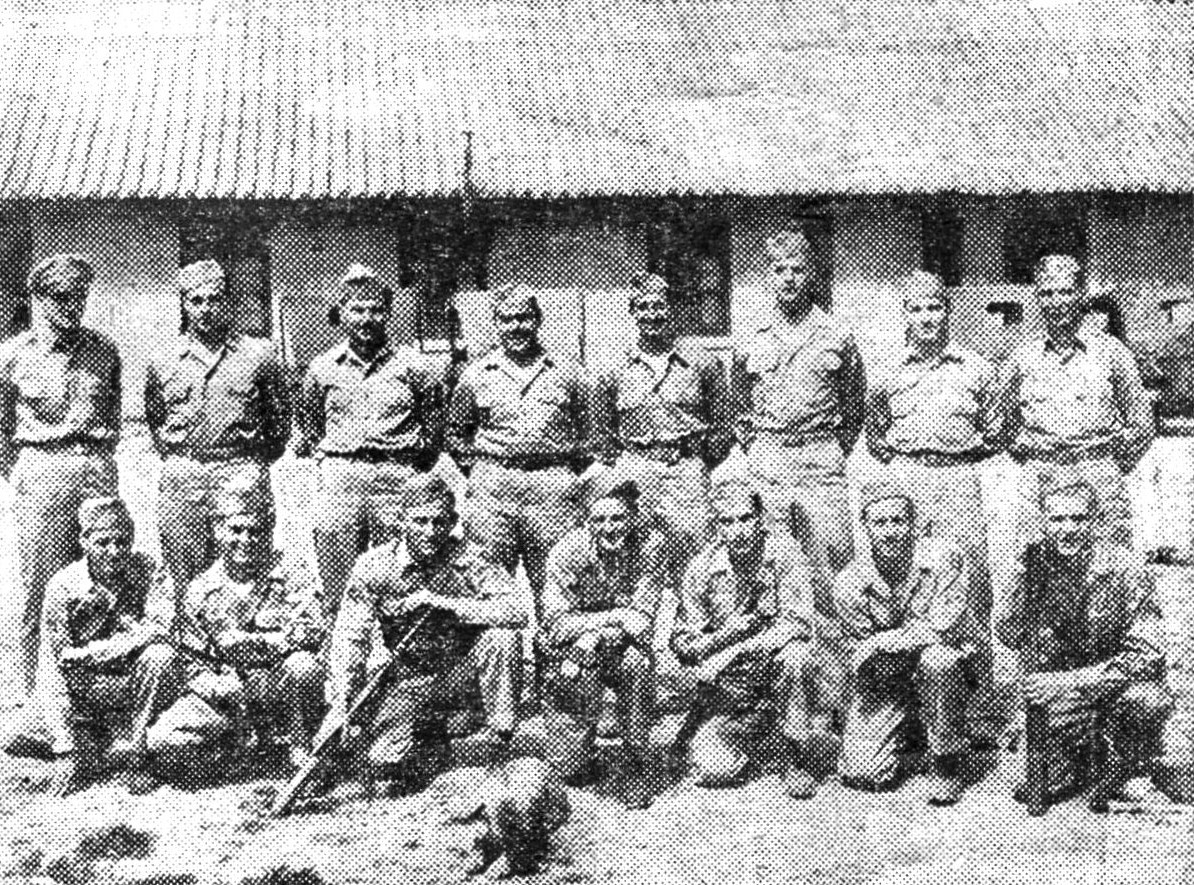 THE "STATISTICIANS" a Statistical Control unit of the Fourteenth Air Force, swept through seven straight games
without a loss to win the first half of the race for top honors in the National Soft Ball League.
Kneeling, front row, left to right, S/Sgt. Melvin H. Reisinger, outfield, Nashville, Tenn.;
Sgt. Charles Stuman, right field, Birmingham, Ala.;
Sgt. Henry McClendon, pitcher, Anniston, Mo.;
Pfc. Joseph L. Sullivan, 3rd base, Pittsburgh, Pa.;
Sgt. James L. Earley, short stop, Pittsburgh, Pa.;
Sgt. Thomas W. Burke, left field, Newton, Mass.;
Corp. John Molnar, catcher, Detroit, Mich.
Rear row standing, left to right), Capt. S. Paul Tuzzeo, manager, Baldwin, N.Y.;
Sgt. Earle J. Carpenter, 2nd base, Atteboro, Mass.;
S/Sgt. Gus N. Chagaris, outfield, Mt. Holly, N.C.;
Pfc. Robert J. Yeaney, outfield, St. Joseph, Mo.;
Corp. Joseph Miele, outfield, New York City, N.Y.;
Corp. Don Humphrey, infield, Rome, N.Y.;
Corp. Robert Able, short field, St. Louis, Mo.'
Lt. Edward P. Patterson, coach, Tulsa, Okla.
Bored by the whole proceedings, Rebel, team mascot, went to sleep while the photo was being made.
THE "STATISTICIANS" a Statistical Control unit of the Fourteenth Air Force, swept through seven straight games
without a loss to win the first half of the race for top honors in the National Soft Ball League.
Kneeling, front row, left to right, S/Sgt. Melvin H. Reisinger, outfield, Nashville, Tenn.;
Sgt. Charles Stuman, right field, Birmingham, Ala.;
Sgt. Henry McClendon, pitcher, Anniston, Mo.;
Pfc. Joseph L. Sullivan, 3rd base, Pittsburgh, Pa.;
Sgt. James L. Earley, short stop, Pittsburgh, Pa.;
Sgt. Thomas W. Burke, left field, Newton, Mass.;
Corp. John Molnar, catcher, Detroit, Mich.
Rear row standing, left to right), Capt. S. Paul Tuzzeo, manager, Baldwin, N.Y.;
Sgt. Earle J. Carpenter, 2nd base, Atteboro, Mass.;
S/Sgt. Gus N. Chagaris, outfield, Mt. Holly, N.C.;
Pfc. Robert J. Yeaney, outfield, St. Joseph, Mo.;
Corp. Joseph Miele, outfield, New York City, N.Y.;
Corp. Don Humphrey, infield, Rome, N.Y.;
Corp. Robert Able, short field, St. Louis, Mo.'
Lt. Edward P. Patterson, coach, Tulsa, Okla.
Bored by the whole proceedings, Rebel, team mascot, went to sleep while the photo was being made.
|
At the final organization meeting on Saturday, April 28, at the office of Maj. Russell Cabot, SOS Special Service Officer, who was the guiding hand behind the organization of the league. Sgt. Lawrence E. Keeney, Charleston, W. Va., was elected President of the league; Pfc. Lewis Bass, Lowell, Ky., was elected Secretary and T/Sgt. Aaron Denis, Little Rock, Ark., was made Chief of Umpires. These men together with a representative from each team form the membership of the league's Board of Governors, to settle any league problems.
Statisticians Win
First Half Title
The Statisticians hammered the Photo Recon ten last Sunday 10-3, for their seventh straight victory, to win the first half championship in the National Softball League at APO 627.
The "number men" swept through the first half schedule behind the excellent hurling of Sgt. Hank McGlendon, who used his fireball and change of pace to limit the opposition to 21 hits and 15 runs in going the distance in every game.
At the plate the Statisticians hammered out 75 assorted base hits for a total of 68 runs off the leagues pitchers, led by Major Bob Smith, first sacker, who piled up a .764 average. Right behind Smith in the batting percentages was McGlendon with a .517 mark.
Here are a few more statistics: Pfc. Joe Sullivan, hot-corner guardian, hit .467 for third place on the team. He also sprained his ankle three times to lead the club in that department.
|
ACK-ACK UNIT STAGES SECOND FIGHT SERIES AN ADVANCED AIR BASE, CHINA - A capacity crowd roared approval at the six bout all-star fight card staged recently in the Flying Ack-Ack battalion's ring at the West China Raider base. In the main event, Pfc. Eddie Fulkerson, QM, 160, and Pfc. Tony Conte, QM, 159, battled through three fast rounds to a draw. The decision of the judges was a popular one. In the semi-final Pfc. Jim Daugherty, 168, AA, got the nod of the judges over Corp. Nick Naccara, 172, AA. Daugherty got in the more effective blows in the free-for-all, leather-swinging three-rounder. In a thrill-packed preliminary Pfc. Johnny Ventrell, 130, AA, gave away a nine pound weight advantage to Pfc. Bull Crosby, QM, but got the decision in one of the best bouts of the night. In the other preliminaries Pfc. Floyd Maine, 145, got the decision over Pfc. Will Brown, 143; Pfc. Lefty McDonough, Ord., 145, beat Bill Warner, AA, 139, and AA mittmen Larry Drago and Ralph Monnon fought to a draw. Pfc. Archie Hershkowitz promoted the show and did the refereeing, while Corp. Bill Albin was the announcer. |
|
CACW EM TEN TOPS SERVICE COMPANY, 6-4 AN ADVANCED CHINA BASE - Sgt. Bob Gress' long single in the bottom half of the fourth inning drove in three runs to climax a four run rally and allow the CACW EM to top the leading Service Company ten 6-4 and clinch a playoff berth for the Base first half softball championship. The Service softballers got away to an early lead when they picked up two quick runs in the top of the first inning, but the CACW EM came back with one in their half of the inning and then tied up the contest with another in the third. In the lower half of the fourth two walks and an infield hit set the stage for Gress' climax clout. The Servicemen added two runs in the fifth but Sgt. Kenneth Love, CACW chucker, shut off the rally and held them the rest of the way. Love pitched steadily all the way for the winners allowing only four scattered hits and tightening up when danger threatened, for the teams fourth straight win. Service Co. 2-0-0-0-2-0-0 4 4 4 CACW EM 1-0-1-4-0-0-x 6 8 2 Batteries: Riegert and Disco; Love and Vivlamore. |
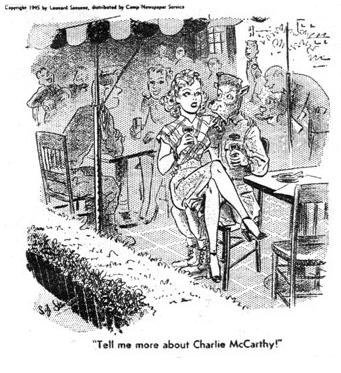
|
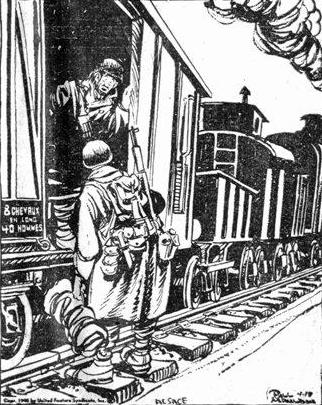 "They oughta hire a homme to clean up after them chevaux."
"They oughta hire a homme to clean up after them chevaux."
|
CSOS Opens School To Train Drivers
KUNMING - Several thousand Chinese truck drivers will be trained by the Chinese and American staff of Chinese Services of Supply, it was announced here today by Col. Mason H. Lucas, chief of staff, Chinese SOS.
The new driver training program will be a continuation of the plan which has been carried on at a large American Army base in India for more than a year.
Explaining the program, Col. Lucas said that the drivers would also be trained to perform basic maintenance on the vehicles. New methods of training to be employed are expected to reduce truck wear and increase the life expectancy of tires and mechanical parts.
Directing the school for drivers which began training the first 100 students Monday, are Maj. Gen. Chien-li and Col. Thomas J. Heavey, both of whom have had long experience with truck regiments and convoy methods.
Actual training is carried on near Kunming. A large open field has been selected, and driving obstacles such as might be encountered on the highways of China have been set up.
New Leader For 69th CW Group
AN ADVANCED 14TH AIR FORCE BASE, CHINA - Lt. Col. James (Buck) Newsome, Wake Forest, N.C., this week assumed command of the oldest USAAF medium bomb group in the China Theater. The group is a part of the 69th Composite Wing.
Col. Newsome has been overseas since Jan. 1944 and has a total of 23 combat missions, having flown with liaison and combat cargo outfits before he was assigned to the group he now commands. Before coming to the group, Col. Newsome was 14th Air Force Executive A-3 Officer.
Officers and enlisted men of group headquarters recently were hosts to Col. Newsome at a welcome dinner.
JAP TRUCKS NOT EVEN SAFE AT NIGHT NOW
HQ., 14TH AIR FORCE, CHINA - It's getting so that it isn't safe for Japanese truck drivers to be alone on the dark roads of China at night. They haven't been safe in daylight for a long time - ever since the 14th Air Force chased Jap planes out of China's skies and started ranging the enemy supply lines in occupied corridors.
So most of the trucking business back of the Jap lines has been done at night, until recently when intruder mission started after their convoys.
The other night a 14th Air Force plane, down on the deck, and working on Jap convoys near Kingmen, clipped a truck which the pilot claims was driving on the wrong side of the road without lights. When he got back to base it was discovered he had kidnapped the truck driver, or at least essential parts of him. The plane was not damaged but the truck driver was.
|
CHINESE WORD-ARTISTS EVOLVE “JEEP GIRLS”
CHUNGKING, May 3 (AP) - The Chinese, who enrich the English language with such phrases as "puppet government," "scorched earth," and "trading time for space," have evolved a new one - "Jeep Girls."
This is a derisive reference to girls of questionable character who earn rides in army jeeps by "mmodest" attentions to the operators of the vehicles.
PROMOTE 3 CCC OFFICERS TO LT. COLONEL
Receipt of orders from Lt. Gen. A. C. Wedemeyer, commanding general, USF-CT, promoting three majors with the Chinese Combat Command to lieutenant colonels, has been announced by Maj. Gen. R. B. McClure, commanding general of the CCC.
The new lieutenant colonels are Harold Marcus of Brooklyn, N.Y., Howard J. Pratt of Portland, Ore. and Carl M. Poston of Columbus, Ohio.
China Guerillas Blast Jap Train
CHUNGKING, May 4 (Globe) - Chinese guerillas dynamited a Japanese train, destroyed 90 feet of the track, and killed a number of soldiers when they placed charges on the Canton-Kowloon railway near Saeklung, the Japanese stronghold and communications center.
Explosives planted in a Japanese launch near Chungshan in the Canton delta killed 40 high-ranking Japanese officers.
These are two of a long list of reports indicating increased activity of Chinese guerillas in occupied China - increased activity that is concurrent with Japanese setbacks in the Pacific.
These guerillas, whom the Japanese call "bandits," are highly mobile and are scattered all over selected areas. They wear no uniforms and never stay in villages. Proof of the effectiveness of their actions is in the Japanese order that all residents of villages must register their names and carry identification cards.
The Mars Task Force It was in the early morn when they started on their task Each thought within their hearts, how long the day would last They passed before the cemetery where comrades lay at rest Those that died at Myitkyina, those who gave their best. And on every face was bitterness toward the ones that brought them grief But they hoped that on the morrow this coward they would meet So ever onward they did go with sore and aching feet On shoulders rode a heavy pack with straps that cut so deep But the day was nearing end for the sun was setting fast For their tired and weary bodies it was time to rest at last. That night was ever long for they tossed in restless sleep With hopes that the morrow forever would keep But daylight found them on their way with a spirit high and strong Over mountain trails and jungles swamps they moved to right the wrong On December 2nd at Tonkwa they found the foe they sought And made them eat the very lead; it was only death they got. But Mars felt a little bad for the battle had a cost For on the following morn a comrade they had lost. But suffer as they may they knew they must not fail So started on their way and braved the mountain trail And before them lay a village where some of them did die The battle field of Tonkwa and there their comrades lie It was in the early dawn when they stabbed us in the back For an artillery barrage began the first attack The sky was filled with shells of death, and how they whistled by The ones that carrying not a name, were those that whistled high The Japs withdrew from battle, but there were some left Those shall never fight again, for they lie in silent death. |
|
Though disgraced and defeated the dawn found them back Assembled in two companies they fought their last attack The machine guns fired a hail of death, they were given every belt The men of Mars gave all they had; another blow was dealt The four point twos, eight ones, and sixties gave them hell The sky was filled with mortar more than I can tell When the smoke of battle cleared the day was almost done And the Japs withdrew from Tonkwa, another victory won. The men of Mars were granted rest for they had earned a break For 200 miles they fought and died all hardships they did take On Jan1st they moved and Mts they could see Ones that reached into the clouds o'er a mile above the sea They slipped and slid and swore like hell, and nursed their aching feet And mountain sides were dug in steps so men and mules could climb They defied the very devil, moved on in rain or shine. Courageous men were these, strong in heart and soul They suffered many miles; now before them lay their goal For the Burma Road was ever near - but barriers lay between The gateway was a valley that hear an enemy unseen So they moved across the valley floor for on the mountains side they fought Again the cost was death for the Japs could not be bought The enemy gave everything, but that was not enough Their artillery and singing lead still made it pretty tough. But their challenge was accepted, the Men of Mars fought on The cry of Victory everywhere, their goal just lay beyond. They prayed to God for strength, courage day and night Strength to endure the shelling and courage to win the fight At last the hills were won, the road to China lay below The enemy was moving south, a weak, defeated foe For the Men of Mars had done their task, relief to China' woe And tomorrow it's another road, that leads to TOKYO. Pfc. Wade D. Hall |
|
AN EAST CHINA 14th AIR FORCE BASE - Lt. Col. Charles H. Older, Beverley Hills, Cal., the highest scoring active ace in the China Theater and now deputy commander of a fighter group of an East China Wing of the 14th Air Force, recently added the Distinguished Flying Cross to his collection of United nations military decorations.
The medal was awarded to him for "extraordinary achievement in aerial flight" by Maj. Gen. C. L. Chennault, commanding general of the 14th Air Force, under whom Older formerly served as a flight leader and operations officer of an American Volunteer Group squadron.
The 27 year old fighter pilot has shot down 18 Japanese aircraft in aerial combat and destroyed
|
He entered the Navy in 1939 after graduation from the University of California at Los Angeles and received his aviation training at the Pensacola Naval Air Station. He was commissioned in 1940 and served for about 15 months with a Marine fighter squadron.
He then joined the American Volunteer Group, which was being formed to serve in China under Gen. (then Col.) Chennault, and fought with the Third Pursuit Squadron in Burma and China until the AVG's disbandment on 4 July 1942, when the AAF's China Air Task Force, which later became the Fourteenth Air Force, took over.
Col. Older then returned to the United States and worked four months as a test pilot for Consolidated Aircraft at San Diego, Calif., before returning to active duty as a captain in the Fourth Air Force, with which he commanded a squadron of P-38's until March of 1944.
June of 1944 found him back in China as operations officer of the fighter group that had succeeded the American Volunteer Group. Later he became deputy commander of this group, now headed by Col. Edward F. Rector, Marshall, N.C., another veteran of the AVG.
In addition to the U.S. Distinguished Flying Cross, Colonel Older also holds the U.S. Bronze Star Medal, the British Distinguished Flying Cross and the Fourth and Fifth Orders of the Chinese Cloud Banner and the Chinese Starred Wings.
|
|
Decorations Given To SOS Personnel
KUNMING - An enlisted man and two officers of Services of Supply here were decorated at retreat ceremonies recently by Maj. Gen. G. X. Cheves, commanding general of SOS.
The Legion of Merit was given to Col. Burton E. Vaughan, Washington, D.C., and Little Rock, Ark., chief of Central Purchasing and Procurement Authority for his services as chief of the procurement section of SOS in the old China-Burma-India Theater. He was cited for an outstanding job of acquiring supplies and service from local sources lifting burdens from overloaded and extended lines of communications.
Col. Aleksei A. Leonidoff, Poughkeepsie, N.Y., now commanding officer of a Station Hospital, was awarded the Bronze Star Medal for his meritorious work as medical advisor to Chinese troops. His efforts were said to have saved the lives of many Chinese soldiers and aided in getting proper medical care for them in the field.
Sgt. Herbert B. Chesley, Signal Corps, Chicago, Ill., was also awarded a Bronze Star Medal for his superior work under exceptionally difficult conditions as a message center chief.
“Special Speaker” For Kwei Chu Hui
KUNMING - The Kwei Chu Hui, an informal club of Master Masons who are officers in American or Chinese forces in the area will be addressed by a special guest whose name cannot be revealed, at their monthly meeting in the Red Cross Town Club at 6:30 p.m. Tuesday, May 8, it was announced by Col. Edward C. Reber, Norristown, Pa., vice president.
|
Gas Maker Built By Air Force GIs
HQ., 51 FIGHTER GROUP - S/Sgt. George A. Fanshier, Oklahoma City, Okla., a member of the "Great Flying Wall of China" Fighter Squadron of the 14th Air Force, reduced Hump tonnage and increased the use of scarce and critical materials in one fell swoop recently when he built an acetylene gas generator from salvaged parts found at his advanced China base.
Utilizing a bomb container, an oil drum, two P-40 gauges and a worn jeep jack, Fanshier developed a crude but effective machine which permits water to mix with carbide to produce heat, thus making the acetylene gas which is used in the welding work at the field.
The machine is important both from the standpoint of availability of a ready supply of gas for the field welding work and the saving of vital shipping space, because previously all the gas had to be flown in over the Hump.
US, China GIs Help Blood Bank
KUNMING - More than 150 American and Chinese soldiers donated blood to the Chinese Army blood bank's mobile unit when it was set up for two days at the headquarters of the Chinese Services of Supply recently.
Although the unit is permanently situated in Kunming, where residents may donate blood at any time, Dr. Helena Wong announced that the unit will travel anywhere a sufficient number of donors are located.
Lt. Gen. Lu Tso, deputy commander of the Chinese SOS, recently made a contribution to the blood bank following an earlier example by Maj. Gen. G. X. Cheves, commanding general USF, SOS, CT. Numerous other military notables also contributed blood to the bank.
Dr. John Scudder of New York, who assisted with the blood bank here, indicated that the two day showing was most satisfactory and said that it was significant that military personnel were making a much more sacrificial effort than the general public. He added that he hoped the example would prove a stimulus to the citizens of Kunming to contribute blood for the Chinese soldiers in the field.
NEW NICKNAME ENDS CO’S RABBIT TROUBLE
HQ., WEST CHINA RAIDERS - Maj. Arthur E. Roberts, commanding officer of a Fighter Control squadron of the West China Raiders, has posted on his orderly room bulletin board the emphatic declaration that there will be "No More Bunny!"
To members of his squadron who have been wrestling with the difficult task of finding a nickname for their outfit, the notation marked the end of an epoch during which the unwanted name of "Robert's Rabbits" haunted the squadron. The straw that broke the bunny's back came when a forward echelon of the outfit got hold of a male and a female rabbit who proceeded to produce additional mascots for the "bunny squadron."
Maj. Roberts frantically produced a precious carton of cigarettes which he promised to the man who came up with a new name and Sgt. Donald F. Grashel, Portsmouth, Ohio, bucked a field of such tongue-twisters as "The Ether Beavers" and "The Octopuses" to come up with the winning name "The Ficons."
By twisting the imagination - and probably the arm - of the nearest Chinese interpreter Sgt. Grashel produced the following liberal translation of the squadron's new moniker - "see to fly."
CN Note Good For A Drink, Says Sergeant Back from US
AIR BASE, APO 627 - For you dreamers who are counting the days on the rotation calendar, and wondering what it'll be like in good old Uncle Sugar Able, here's an eye-witness account from a "Flying Tiger" who's been there and is back to tell the tale.
Naturally, it was wonderful. T/Sgt. Maurice C. Pepin, Los Angeles, who was home on a 30-day furlough, is only human, too. Sgt. Pepin of the Air Service Command and currently assigned to this Base, flew all the way, spent thirty only-too-short days at home, and was back here 30 March.
"After 27 months in China, I expected things at home to look pretty different," said Sgt. Pepin. "I was rather surprised that - well, things were the same. Of course I was glad to find them that way."
Things were the same but he guesses that "he was pretty excited," as who wouldn't be and Sgt. Pepin got sick after drinking two glasses of stateside milk when he landed at LaGuardia Field in New York City.
"I spent only one day at the reception center. The processing took only two and a half hours. The was no red tape to speak of, and everybody treated us nice."
If you're one of the lucky guys ready to go home, sew on those well-deserved overseas stripes. It'll pay you in better stateside service everywhere you go. Pepin said he felt sort of self-conscious about wearing them. Naturally trains and buses are still crowded.
He didn't have his stripes on at the New York Central station, a negro porter figured that he was from overseas and tipped him off about wearing the stripes. He did, and always was well taken care of thereafter.
Everybody is curious about the China Theater, says the sergeant. To the people stateside, China is really "the end of the line." In fact, their lack of knowledge about it makes it out of this world. Newspapermen in both Los Angeles and Seattle, where he visited his parents, shot plenty of questions at him. But, says Sgt. Pepin, he came home for a well-earned rest and not a lecture tour and so he kept mum.
One compensation about this curiosity, says the sergeant with a longing look in his eyes, is the fact that a one hundred CN note, chickenfeed in China, is good for a drink at almost any U.S. bar. Just order your drink (Scotch-and-soda is around 85 cents now), slap down your CN note, and the bartender will grab it for a souvenir. And the guy on the stool next to you probably will want one too, and will most likely ply you with plenty of questions and drinks. CN notes make good souvenirs.
Education Making Strides In China
KUNMING - Education is making some gains in China in spite of war conditions, Dr. T. C. Huang, (University of Chicago) dean of Teachers' College of Southwest Associated universities, told members of the American University Club of Kunming at the bimonthly meeting in the Theatre of Hostel 1 last Sunday afternoon.
he pointed out that while there were 320,000 secondary schools with 18,000,000 enrolled in 1936, a figure which dropped to 12,000,000 in 1938 due to new compulsory education laws requiring at least two years' schooling, government aid to indigent, exemption from military service for youth in school, that enrollment had jumped to 24,000,000 in Free China alone in 1943.
The 108 colleges which had 41,000 students in 1936 jumped to 52,000 in 1943. Secondary schools showed enrollment gain from 627,000 to 920,000 in the same period.
KEEPING PALS TOGETHER AIDS CACW TEAMWORK
AN ADVANCED AIR BASE, CHINA - Keeping buddies together is one of the reasons the Fourteenth Air Force's hard-hitting Chinese-American Composite Wing has the close knit cohesion which means so much to team play - the team play which has become such an important factor in the success of the U.S. Army Air Forces.
The other day some 14 recently arrived EM replacements from the U.S. arrived at CACW headquarters and were pleasantly surprised to learn their friendships of POE days were not to be broken.
"Let's see now," said Major Charles Johnson, Wing A-1 Officer. "Which of you wants to stay together and go to this outfit? I can send two to this one, three to the __ fighter group." It didn't take long for the men to make up their minds and the CACW outfits to which they are assigned will have received more "teams" Major Johnson explained.
"We try to do the same thing with pilots as we do with ground crew men, " he added. "Men who have been flying wingtip to wingtip back in the States do a lot better job if they stick together over here. All through the CACW, as a matter of fact, the team play which is built up on individual friendships is really amazing. We're doing all we can to continue that sort of thing with all new arrivals.
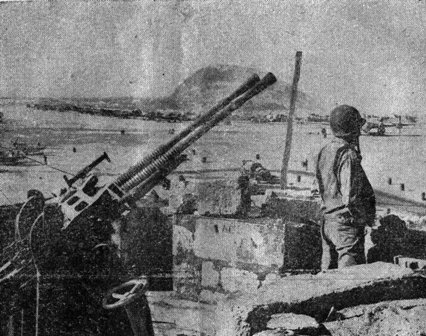 DEFENDERS - Leatherneck stands watch on Motoyama Airfield Number 1. Torpedo bombers of 4th Aircraft
Wing help defend Iwo Jima after its capture by Marines Infantrymen. American planes in background range from B-29s
to small grasshopper spotters. Mount Suribachi can be seen beyond.
DEFENDERS - Leatherneck stands watch on Motoyama Airfield Number 1. Torpedo bombers of 4th Aircraft
Wing help defend Iwo Jima after its capture by Marines Infantrymen. American planes in background range from B-29s
to small grasshopper spotters. Mount Suribachi can be seen beyond.
|
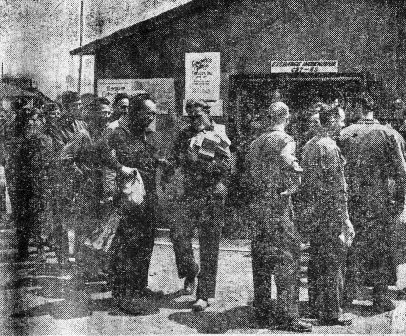 GI COMMERCE IN CHINA - Lured on by modern merchandising methods employed by the post exchange of the Chinese
Combat Command headquarters, Corp. Harvey T. Dack, Hollywood, Cal., breaks through the line, bursting with enthusiasm
after securing his rations. The CCC does its own promotion with posters which remind GIs and officers to purchase
gifts long enough in advance to assure delivery in time for U.S. holiday delivery.
GI COMMERCE IN CHINA - Lured on by modern merchandising methods employed by the post exchange of the Chinese
Combat Command headquarters, Corp. Harvey T. Dack, Hollywood, Cal., breaks through the line, bursting with enthusiasm
after securing his rations. The CCC does its own promotion with posters which remind GIs and officers to purchase
gifts long enough in advance to assure delivery in time for U.S. holiday delivery.
|
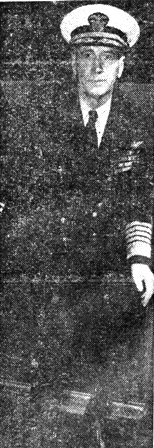 FLEET ADMIRAL Ernest King is shown leaving automobile at the entrance to the White House. He is on his way
for conference with President Harry S. Truman.
FLEET ADMIRAL Ernest King is shown leaving automobile at the entrance to the White House. He is on his way
for conference with President Harry S. Truman.
|
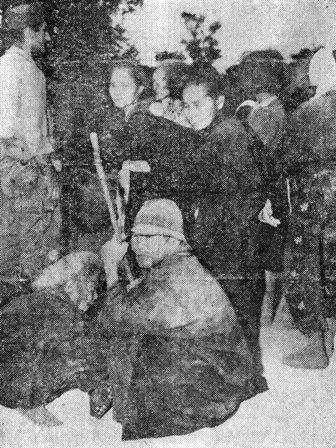 REFUGEES found hiding in cave on Okinawa await turns for examination by U.S. Navy doctors and medical corpsmen.
This family left hideout after neighbors told them of kind treatment received from Government units of invading
Americans.
REFUGEES found hiding in cave on Okinawa await turns for examination by U.S. Navy doctors and medical corpsmen.
This family left hideout after neighbors told them of kind treatment received from Government units of invading
Americans.
|
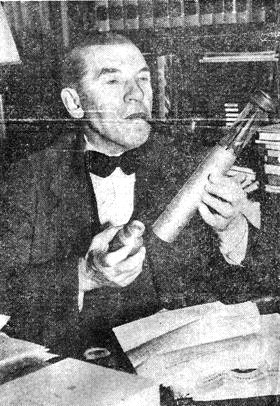 SOUVENIR - Representative Sol Bloom of New York examines German incendiary bomb, a gift of Gerald Spenser
Sumner, member of Parliament. Bomb was dropped on London from German plane, but failed to explode. Pipe-smoking
congressman is seeing how it works.
SOUVENIR - Representative Sol Bloom of New York examines German incendiary bomb, a gift of Gerald Spenser
Sumner, member of Parliament. Bomb was dropped on London from German plane, but failed to explode. Pipe-smoking
congressman is seeing how it works.
|
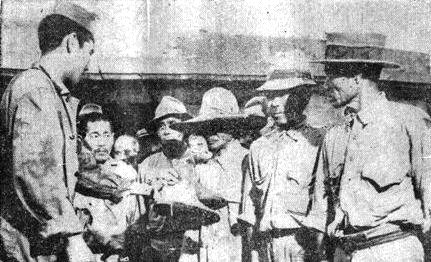
|
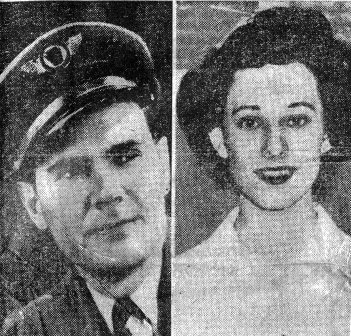
|
(Above right) ?CRASH - Capt. Harold Houston Jones, 32 (left) of Norfolk, Va., was pilot of the Pennsylvania Central Airlines plane which crashed near Morgantown, W. Va. At right is Marion Adams, 21, of Bellevue, Pa., who was stewardess on the plane. All 17 passengers and three crew members were killed. Aircraft was en route from Pittsburgh to Birmingham and apparently hit treetops at side of mountain during storm. Searchers reached wreck on foot.
The CHINA LANTERN is the weekly newspaper of the United States Forces in the China Theater and is published by Lt. Lester H. Geiss, Editor-In-Chief, for military personnel only. T/Sgt. Harry Purcell, Managing Editor; Sgt. Maurice Pernod, Production Chief. Editorial offices: Hqrs., SOS, China Theater, Kunming, China, and Hqrs., SOS, Calcutta, India. Printed by Ajit Kumar Sinba at the "Amrita Bazar Patrika" Press.

MAY 4, 1945
Adapted from the original issue of The China Lantern
Copyright © 2009 Carl Warren Weidenburner
TOP OF PAGE PRINT THIS PAGE ABOUT THIS PAGE
SEND COMMENTS CLOSE THIS WINDOW
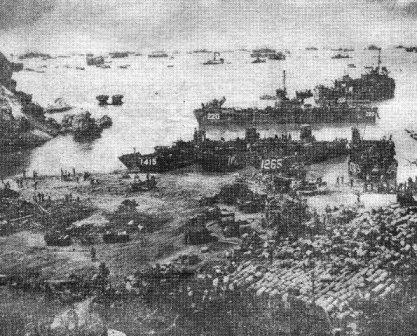 CLOSING IN ON TOKYO - Area buzzes with activity as American men and supplies land on west coast of Okinawa.
In the background can be seen battlewagons, cruisers, destroyers, assault craft and transports of the United States
fleet as the mighty armada edges closer to Tokyo.
CLOSING IN ON TOKYO - Area buzzes with activity as American men and supplies land on west coast of Okinawa.
In the background can be seen battlewagons, cruisers, destroyers, assault craft and transports of the United States
fleet as the mighty armada edges closer to Tokyo.
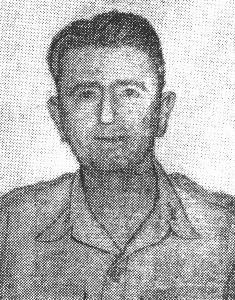
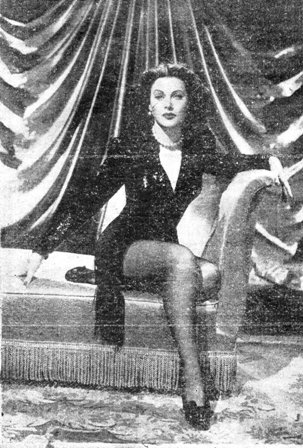 HEDY LAMARR, exotic Hollywood glamour dispenser, puts her best foot forward to step right into the
Lantern's weekly charm dept. Heddy's glittering costume offers drastic contrast to the more
conservative attire worn this side of the Rock Pile.
HEDY LAMARR, exotic Hollywood glamour dispenser, puts her best foot forward to step right into the
Lantern's weekly charm dept. Heddy's glittering costume offers drastic contrast to the more
conservative attire worn this side of the Rock Pile.
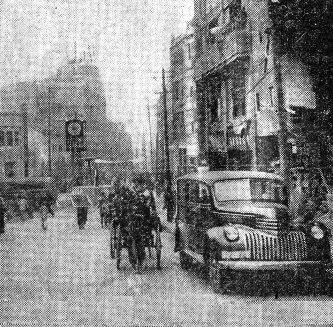 BANKING DISTRICT - Chung Chen road, looking east across Sing Kai Square.
BANKING DISTRICT - Chung Chen road, looking east across Sing Kai Square.
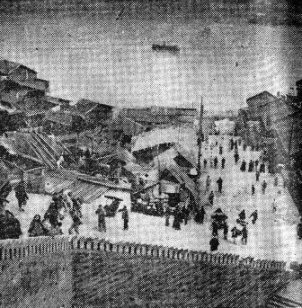 WANG LUNG GATE STEPS lead from the heart of the business district in downtown Chungking to the ferry which
connects the area known as the South Bank to the city proper.
WANG LUNG GATE STEPS lead from the heart of the business district in downtown Chungking to the ferry which
connects the area known as the South Bank to the city proper.
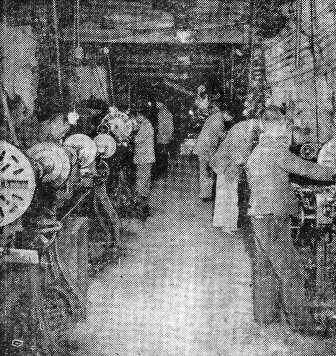 MING SUNG SHIPYARDS in Chungking offers an example of one of the city's many underground machine shops.
MING SUNG SHIPYARDS in Chungking offers an example of one of the city's many underground machine shops.
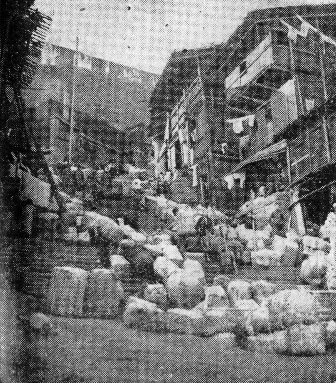 RIVERFRONT TRAFFIC - All goods arriving at the busy port is carried up steps into the city on the shoulders
of coolies.
RIVERFRONT TRAFFIC - All goods arriving at the busy port is carried up steps into the city on the shoulders
of coolies.
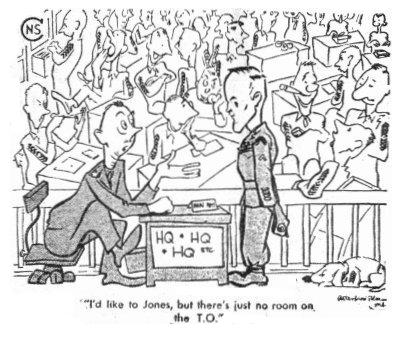
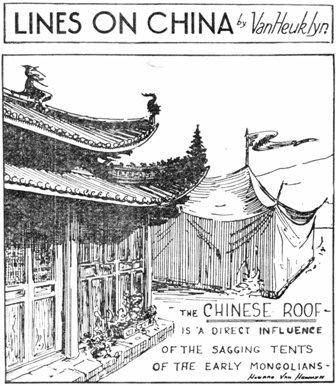

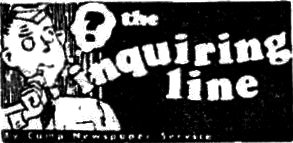
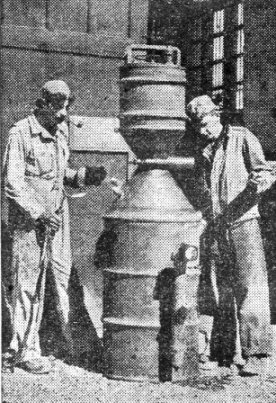 S/Sgt. George A. Fanshier, left, Oklahoma City, designer of the acetylene generator and Pfc. John Park, Tyron, Pa.,
who helped with the gadget's construction.
S/Sgt. George A. Fanshier, left, Oklahoma City, designer of the acetylene generator and Pfc. John Park, Tyron, Pa.,
who helped with the gadget's construction.